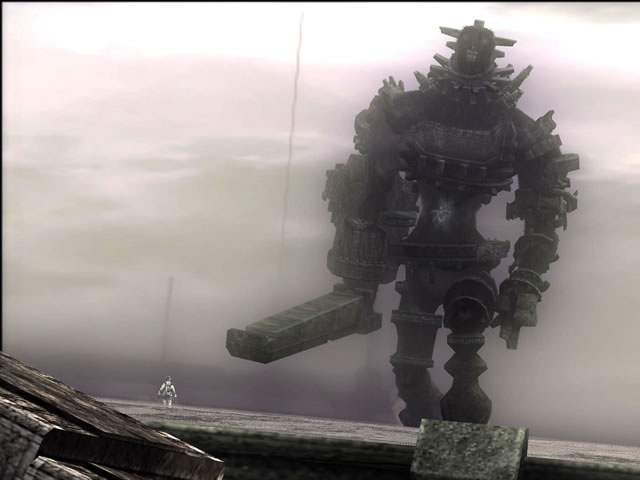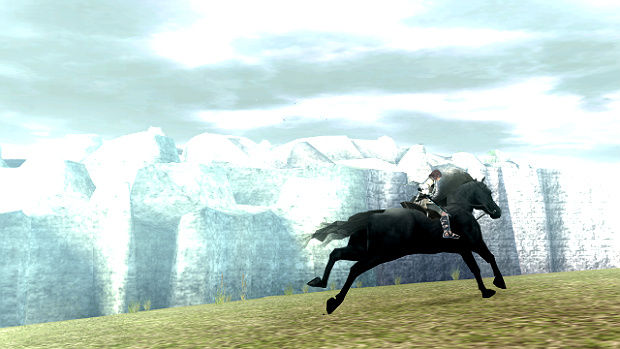Last updated on March 4, 2013
Well, E3 came and went. So here’s some E3 coverage, for all you news mavens.
I must be the only person in the entire world of gaming who have absolute zero love for Ico or Shadow of the Colossus.
I’m not sure what it is. Frankly, the games Team ICO produces create some of the most aesthetically breath-taking visuals that one could possibly see in a video game. Seriously, take a look at this:
This is an in-game screenshot. They have a way with colors, grain filters, and musical/natural ambiance that really lends a certain feel to their games: melancholy, doubt, and hopelessness. There’s a feeling of inevitability in Shadow of the Colossus, in that the hero of the story (if one can call him that) must kill 13 colossi in order to bring his dying princess to life again. However, the colossi do not actively pursue the hero; they merely wander their land, and you, the player, intrude upon their territory. It is you who attack them and provoke them into acts of violence, and it is you, when you land the killing blow, that sees the death of a beautiful creature in a bleak, desolate wasteland – one to which you have added considerably more hostility. It’s truly remarkable how a game can engender those feelings if one is open to such experiences.
However, one notes the title of this blog, and the obvious caveats presented beforehand, and might ask: why do you celebrate the death of a game that looks, from your description, to carry video games “farther” than they have before? Does a eulogy for The Last Guardian seem more appropriate than your seemingly destructive approach?
If the imagery I am giving is me dancing upon the game’s grave, that’s not it at all. I find Team ICO’s games to be works of aesthetic beauty, yes, but they are not, in any sense, good games. Strip Shadow of the Colossus down to its constituent parts, and all that decorative makeup covers an ugly pig of a game. In the moment, it’s an amazing experience, but not a game. The aesthetics and “feel” come right in the way of creating an enjoyable game, or something I would call “fun”, at the least.
I’ve never played a game that so vehemently despises the player’s abilities. For one, the horse operates like a “real” horse, with momentum, an inability to turn quickly, and can get tired. In a video game, I do not really want any of these things, especially if I am in danger of being crushed by the giant hammer of a creature I have agitated! In time, you can get used to it, but it lacks intuitiveness. Controlling the bow is a mess; certainly, anybody riding a horse and firing wooden missiles certainly wouldn’t succeed upon the first try, but one has to imagine that controlling the horse, camera, direction the horse moves, and how far the bowstring is pulled back at the same time strikes the player as clunky, no matter how realistic it looks. There are better ways to present that kind of experience (see: Ocarina of Time, any Zelda game after 1997 released for a major console).
Climbing the beasts themselves is more time-consuming than challenging; your slaying of the creature becomes a recurrent theme, while you are constantly thrown off their back over and over until you hit the exact linear sequence to finish the foe off. Even then, the colossi are usually too stupid or oblivious to actually finish you off, and most times you can regain your health with little worry. The game even providing glowing marks to show the colossi weak points, a bizarre and frankly out of place choice in a game so utterly focused on its own beauty.
Nothing encapsulates the focus of the developers more than the journey between colossi. There are no enemies in this vast and empty world except for the giant entities one must fight in order to win. But a desolate landscape does nothing for the player other than to establish setting. And thus, all one does in these sequences is pilot a horse, using the shining light from your sword, to yet another location to kill yet another colossi. Whereas some games repeat set pieces and action because, truly, the game mechanics themselves support even the re-use of various art and computing assets, Shadow of the Colossus does little with these sequences other than mood lighting. Yes, there’s a plot (which I won’t spoil because I am nice), but again, it’s just an overlay.
I am not, in this venture, trying to state “this is what video games are!” and limit their potential. However, when a game comes along and snatches that mantle of “great game”, I expect it to follow some level of interactivity, and creative use of that interactivity. Perhaps the most egregious error are these fights with the colossi – there is no challenge, and subsequently no consequences. Even in the context of the story, shouldn’t I be fragile? Shouldn’t falling off these massive creatures crush my bones and kill me? Yet I just end up with a few scratches, and I jump right back into the fray.
Clearly, there’s a contradictory strand working here: the beautiful aesthetics and narrative tied in with traditional video game tropes. I bet you can see which side won out.
This is a problem with video games and such aspirations, in that they seek one idea and instead produce a product fitting for mass cultural consumption. A more modern example would be David Cage’s Heavy Rain, basically a game that amounts to an interactive movie such as was the norm for CD-ROM based FMV games in the 1990s. Those games were limited by the technology of their era, churning out horrible video quality and, in general, producing a line of products that most video gamers look at with derision and laughter. Yet, now that we have superior technology, suddenly these kinds of games have come back into vogue with alarming frequency. Clearly, this isn’t a positive trend.
They start with the pretension of greatness and work down. So it is with life, as well. When John and James ask to be seated at the left and right hand of Jesus, they start with that presumption of greatness and grandeur, that Jesus was to come back as a warrior king in the Davidic tradition. However, Jesus is not that kind of king, but a new one entirely:
41 Hearing this, the ten began to feel indignant with James and John. 42 Calling them to Himself, Jesus *said to them, “You know that those who are recognized as rulers of the Gentiles lord it over them; and their great men exercise authority over them. 43 But it is not this way among you, but whoever wishes to become great among you shall be your servant; 44 and whoever wishes to be first among you shall be slave of all. 45 For even the Son of Man did not come to be served, but to serve, and to give His life a ransom for many.” (Mark 10)
We find that in the new kingdom, it is the servant and the slave who comes first, not the wealthly nor the famous. What matters isn’t one’s beauty, or artistic aspirations, but what lies beneath, the simple act of being human beings to one another. Status, in other words, is merely secondary. To start with that as the basis of human relations is problematic; how much more is the beginning for grand “meaningful” content been the bane of many games hoping, wishing, and praying to become the artistic venture of their generation!
Believe me, I’ve tried several times to like the game. It just doesn’t click, and doesn’t work, and I for one will not gloss over its flaws as a game just to satisfy the “games are art” crowd in its quest to justify its childhood pastime, if only to continue their path onto perpetual adolescence. We should demand more of games that strive for such goals; becoming lax means we, the consumer, are willing to settle for less as long as it has the pretensions and appearance of what society would consider “art”. Let video games be judged by their own terms, not by some outsiders who have no business intruding on such a classification. Let interactivity be real and natural, not fake and forced. Let a game not break its own suspension of disbelief upon a single reflective glance.
Let’s not hope for The Last Guardian.


